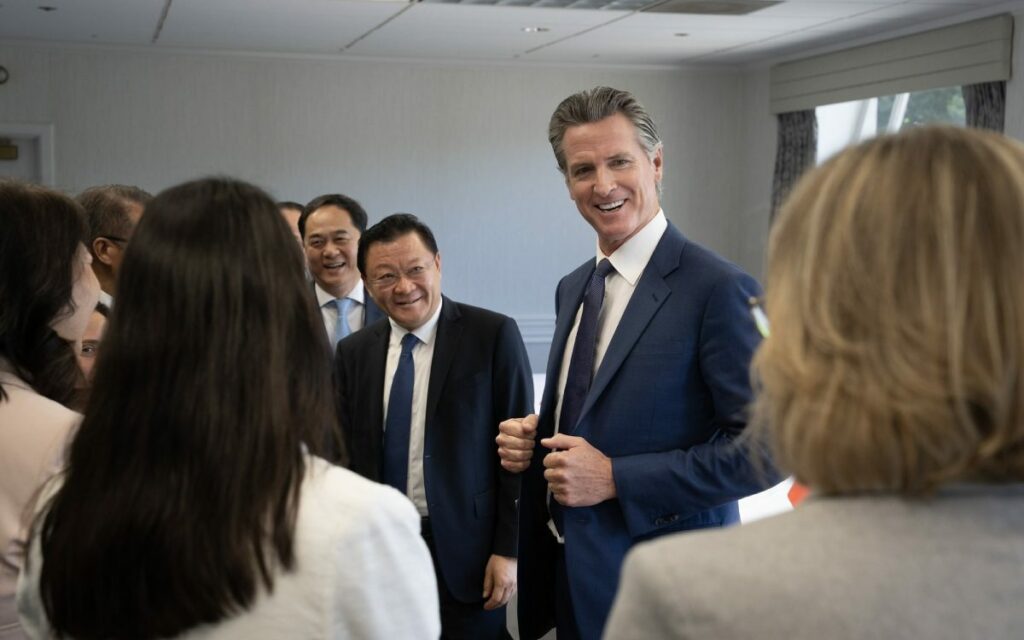
Unions and their supporters like to believe in the fantasy that all businesses have giant pots of money they are hoarding and dipping into them will not affect anything else. Pictured: California Governor Gavin Newsom. Photo Credit: CAgovernor/X.
A new development in the long-simmering debate over the impacts of minimum wage took place recently south of the border in the US, and offers yet another lesson about the unintended consequences of government policies. Not surprisingly, this took place in California on the “left coast,” and concerned an increase in the government-mandated minimum wage to US$20 in that state. This resulted from a campaign by fast food workers, and they convinced leftist California Governor Gavin Newsom to go along. This minimum wage hike only applies to fast food workers, which is an interesting detail considering that unions always argue their objective is to fight for better wages for all workers.
Despite the jubilation and melodrama of the unions declaring victory and the initial delight of the workers involved, several months later it was revealed that about 10,000 fast food jobs had disappeared – so far – since the wage hike was implemented. Fast food outlets reacted to the change by doing such things as pre-emptively laying off fast food delivery drivers, raising their prices to customers in the state by 5 to 15 per cent, stopped hiring new employees and some restaurants in the state even closed, taking the jobs they provided with them.
When the change was first announced and Newsom was asked if prices would not simply rise as a result of the wage hike, he said he’d heard that argument before but it had never actually happened. Yet the facts speak for themselves, and it sure has happened this time. Indeed, it has happened every single time wages are raised, despite how much leftist politicians and unions want to deny it. Unions and their supporters like to believe in the fantasy that all businesses have giant pots of money they are hoarding and dipping into them will not affect anything else. The truth is that most businesses operate in highly competitive markets – the fast food industry surely does – and any cost increase will find its way into final consumer prices.
In many industries, this is not a good time for unions to be demanding significant wage increases. Technology is advancing rapidly and can replace workers more readily than in the past. Been in a McDonald’s lately? If so, you have probably ordered your meal at a computer terminal that is easy to use and accepts various convenient forms of payment. This means of transacting business works well for the customer and well for the business, but not so much for the human employees that are being replaced.
More progress in robotics will likely end up replacing many more jobs currently held by people, and the potential to be found in Artificial Intelligence (AI) is yet to be fully seen but will undoubtedly displace many more jobs. The bottom line is that the types of jobs typically found in a fast food business are very vulnerable to being replaced by technology and the higher wages go, the more likely this will happen. Jobs for people that are lost to automation will never be coming back
Despite claims by labour unions and their sympathizers that increasing wages in one sector “lifts all boats,” wage hikes without corresponding productivity increases merely take money out of one group’s pockets to put in another group’s. The highly unionized auto industry is a good example. One of the few large private sector unionized industries remaining, that industry has nevertheless suffered considerable job loss because of technology. Many more cars are produced today with thousands fewer workers as technology has replaced jobs held be people. The wages and benefits for the workers left in the industry are still relatively high, but merely translate into higher prices for cars for everyone else. Not exactly a win-win.
Unfortunately for unions and the workers who want to be paid more than they are worth to the business, the laws of supply and demand will always apply. It is striking that the same people who support raising the price of tobacco, alcohol, gasoline, sugary drinks and other “undesirable” products believing it will reduce the demand for those items also believe that increasing the price of labour will not have the same impact. Sorry folks, but the basic laws of economics do not have exceptions.
The more effective way to achieve enduring and warranted wage increases is to increase productivity so workers are worth more to their employer. But unions always want more for less, and often along with wage increases they seek reduced hours, longer breaks and more benefits, all of which reduce the business’ productivity. That’s not a winning strategy in the long run. Even if the unions are aware of this reality, they and their complicit politician friends, like Gavin Newsom and some Canadian politicians, will continue to promote the view that hiking wages has no impact on employment. This betrays not only the workers, but the health of the economy as a whole.

She has published numerous articles in journals, magazines & other media on issues such as free trade, finance, entrepreneurship & women business owners. Ms. Swift is a past President of the Empire Club of Canada, a former Director of the CD Howe Institute, the Canadian Youth Business Foundation, SOS Children’s Villages, past President of the International Small Business Congress and current Director of the Fraser Institute. She was cited in 2003 & 2012 as one of the most powerful women in Canada by the Women’s Executive Network & is a recipient of the Queen’s Silver & Gold Jubilee medals.




















